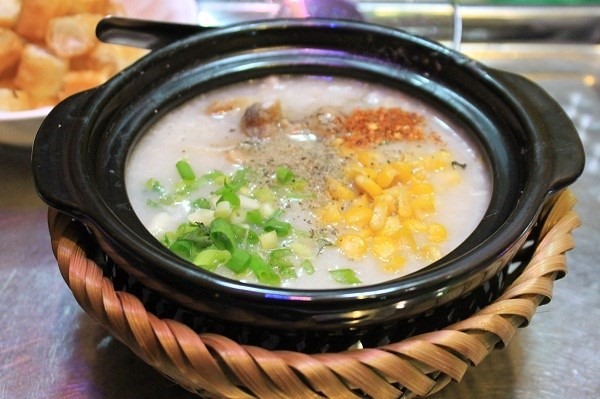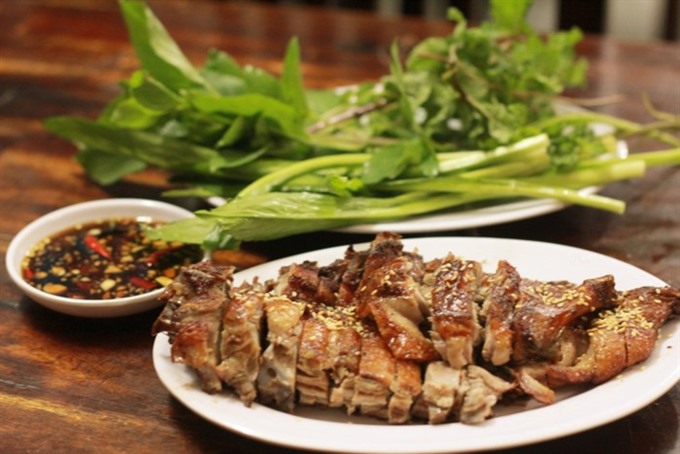Smaller, tastier, healthier: the Vân Đình duck
 |
| Stirring up the pot: Boiled duck is cut into pieces and placed on top of the porridge, before adding the sauce and stirring it well. |
Industrial livestock and poultry can never compare to their ’free range’ counterparts, especially in terms of taste.
I realised this fact anew recently after a friend, Nguyễn Văn Đông, invited me to visit his home in Vân Đình Village, in Hà Nội’s Ứng Hòa District.
The name of the village will ring a bell in the minds of traditional food aficionados all over the country. For hundreds of years, the Vịt cỏ Vân Đình (small-sized duck of Vân Đình) has been well known for its special taste and featured on the menu of many restaurants.
Despite this fame, however, the village is no longer a real home to its speciality, with many preferring to raise the bigger white duck (about 1.8-2kg each) with industrial feed.
Đông said his family is trying to restore breeding of the traditional small-sized duck (about 1.2-1.3kg each) because its meat is more firm and fragrant.
He also said his mother Bùi Thị Ngữ, 76 is known in the area for her “secret recipes” with the vịt cỏ Vân Đình. The vịt nướng riềng, sả (roast duck with galangal and lemongrass), vịt nấu măng (duck with bamboo shoot) and cháo vịt (duck porridge) that she makes stand out from others, he added.
While it is normal that people rave about their mother’s cooking, Đông’s is no idle boast, because the restaurant that she runs is hugely popular in the area.
Roast duck
Ngữ said that before the duck is roasted, it should be marinated with galangal, lemongrass, spicy and lá mác mật (a kind of wild leaf found in northern provinces like Cao Bằng).
“We always order the mác mật leaves from Cao Bằng several months in advance and store them in the refrigerator. The leaves create a special aromatic flavour while the meat is roasted on wood charcoal,” said Ngữ.
Đông said his mother’s shop is the most crowded one in the Vân Đình Townlet along the 21B Highway because the ell and smoke of the duck being roasted entice many duck gourmets. Another of Ngữ’s “secrets” is the dipping sauce for the dish.
“Making the sauce is an art, my mother knows how to adjust the garlic, ginger, pepper, chili, vinegar and sugar so that it is not too salty or sweet, and gives off an appetising smell.as for it to be not too salt, too sweet but having a great smell of these mixed ingredients,” he said.
The dish is typically served with several herbs including pieces of banana flowers, green bean sprouts, basil, and eryngium (cilantro or long coriander), Ngữ said.
After enjoying the tastiest duck dish I’ve had so far, I can add my voice to those who praise Ngữ’s recipes.
Duck porridge
Phùng Văn Long, a resident of Hà Nội’s Hai Bà Trưng District, is a self-confessed addict of Vân Đình duck porridge.
He recalled that on a business trip to Vân Đình one day, he suffered a sudden cold and his friend bought him a bowl of duck porridge.
“I recovered immediately after eating the porridge. I fell in love with its aroma and taste. The combination of new rice and sticky rice, the smell and crispiness of fried dried onions, coriander and spring onions and the greasy Vân Đình duck meat is too good,” Long said.
Ngữ said the most important part of the dish is the real Vân Đình duck, which is boiled before rice is added to the broth and cooked over light fire for an hour.
Other ingredients (when one duck is cooked) include 10 dried onions, five garlic cloves, a piece of ginger, 200g of rice and a handful of sticky rice, salt, pepper, fish sauce, green onions, cilantro and coriander.
The boiled duck is cut into pieces and placed on top of the porridge, before adding the sauce and stirring it well. “This is a suitable dish for the elderly and those who are sick,” she said.
Ngữ said the porridge is very good for children to cool down heat in summer and recover cold in winter.
She told me that she feels sad that many of her villagers have stopped raising the smaller ducks. “They all are running to make bigger profits by raising bigger duck breeds imported from China.”
She insisted that she would not change.
“Despite everything, we will still raise the traditional ducks for both purposes: serving customers and preserving the valuable species.” — VNS
| One to remember: Bamboo shoot with duck meat eaten with bún (vermicelli) is unforgettable. |
 |
| Scrumptious: A plate of roasted duck. — Photos vaobepnauan.com
Nhat Lam News./ Origin: Viet Nam News by Hà Nguyễn |



